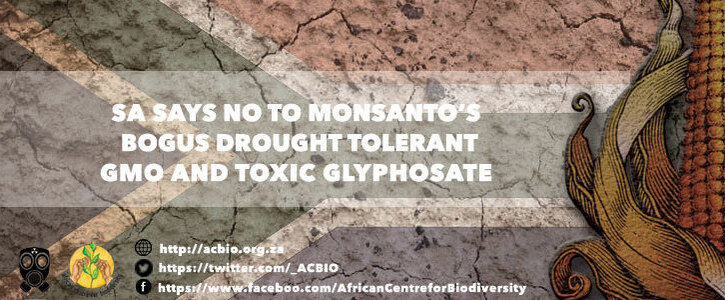To: The Chairperson, Executive Council GMO Act - Ms Nompumelelo Mkhonza
SA Says NO to Monsanto's bogus drought tolerant GMO maize and toxic glyphosate
The deadline for submissions has passed and we have learnt that Ms Mkhonza the Chairperson of the GMO Act Executive Council has still approved Monsanto's application. The African Centre for Biodiversity's next step is to launch a formal appeal to the High Court. Stay tuned for updates.
.jpg)
We all love mealies and the many other food products that we get from maize seeds. But Monsanto, a multi-national seed and chemical company, is busy colonising Mzansi's food system. Monsanto genetically engineers the DNA of different plants, and sells their products to farmers promising a better harvest. But wherever Monsanto does business communities health and the environment are at risk. In order to make even more money, they are trying to push through their so-called "drought tolerant maize" seed to be commercially available to our farmers.
Monsanto is using the drought and our rising food prices as a means of inserting its bogus drought tolerant technology and maize into the South African food systems. We strongly challenge claims of drought tolerance as a trojan horse and yet another risky and novel gene introduced into our staple food.
We demand a ban on the use of glyphosate which Monsanto sells with this product to our farmers and remind the Executive Council that the WHO International Association for Research into Cancer (IARC) categorised glyphosate as a class 2A carcinogen in May 2015 and a 2014 academic study found that workers spraying glyphosate formulations (such as Monsantos RoundUp herbicide) had an increased risk of Non-Hodgkin Lymphoma, a type of cancer [1]
[1] Schinasi L, Leon ME (Apr 2014). "Non-Hodgkin lymphoma and occupational exposure to agricultural pesticide chemical groups and active ingredients: a systematic review and meta-analysis". International Journal of Environmental Research and Public Health. 11 (4): 4449–527
Monsanto is using the drought and our rising food prices as a means of inserting its bogus drought tolerant technology and maize into the South African food systems. We strongly challenge claims of drought tolerance as a trojan horse and yet another risky and novel gene introduced into our staple food.
We demand a ban on the use of glyphosate which Monsanto sells with this product to our farmers and remind the Executive Council that the WHO International Association for Research into Cancer (IARC) categorised glyphosate as a class 2A carcinogen in May 2015 and a 2014 academic study found that workers spraying glyphosate formulations (such as Monsantos RoundUp herbicide) had an increased risk of Non-Hodgkin Lymphoma, a type of cancer [1]
[1] Schinasi L, Leon ME (Apr 2014). "Non-Hodgkin lymphoma and occupational exposure to agricultural pesticide chemical groups and active ingredients: a systematic review and meta-analysis". International Journal of Environmental Research and Public Health. 11 (4): 4449–527
Why is this important?
We are deeply troubled by the continuous introduction of risky GMOs into our food and farming systems. Since its introduction into our food system in 1998, it has done nothing to address our nation’s hunger problems. Instead, we are left with polluted soil and water and loss of our superior, local farmer-bred varieties of maize.
We are also extremely concerned about the political economy of seed control that Monsanto has imposed on our seed system, which utterly undermines our food sovereignty and breeds a dependency on Monsanto's industrial systems and technologies.
Local land belonging to smallholder farmers in SA have already been contaminated. More GMOs will only exacerbate this situation and further erode farmers’ seed systems. We call on our government to reject Monsanto’s application and begin a real dialogue with South Africans to transition out of industrial and GM-based agriculture systems and work towards real climate resilient solutions that are ecologically sustainable, socially just and takes care of the nutritional needs of all South Africans
We are also extremely concerned about the political economy of seed control that Monsanto has imposed on our seed system, which utterly undermines our food sovereignty and breeds a dependency on Monsanto's industrial systems and technologies.
Local land belonging to smallholder farmers in SA have already been contaminated. More GMOs will only exacerbate this situation and further erode farmers’ seed systems. We call on our government to reject Monsanto’s application and begin a real dialogue with South Africans to transition out of industrial and GM-based agriculture systems and work towards real climate resilient solutions that are ecologically sustainable, socially just and takes care of the nutritional needs of all South Africans
How it will be delivered
We will email signatures to The Chairperson after a press conference to mark the number of people who object.
.png)